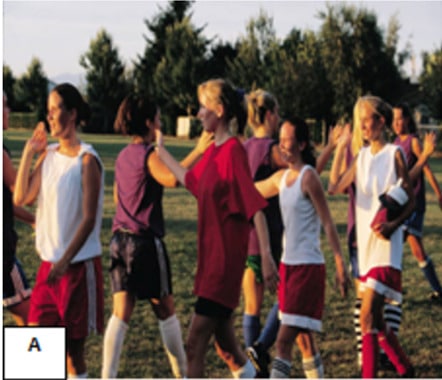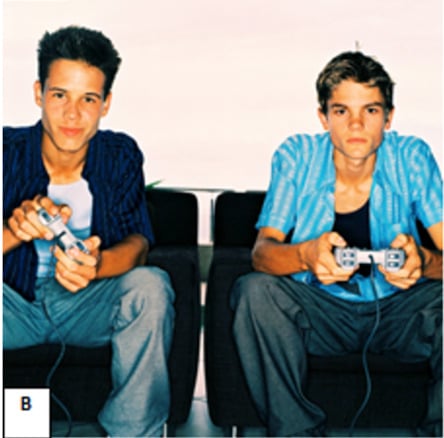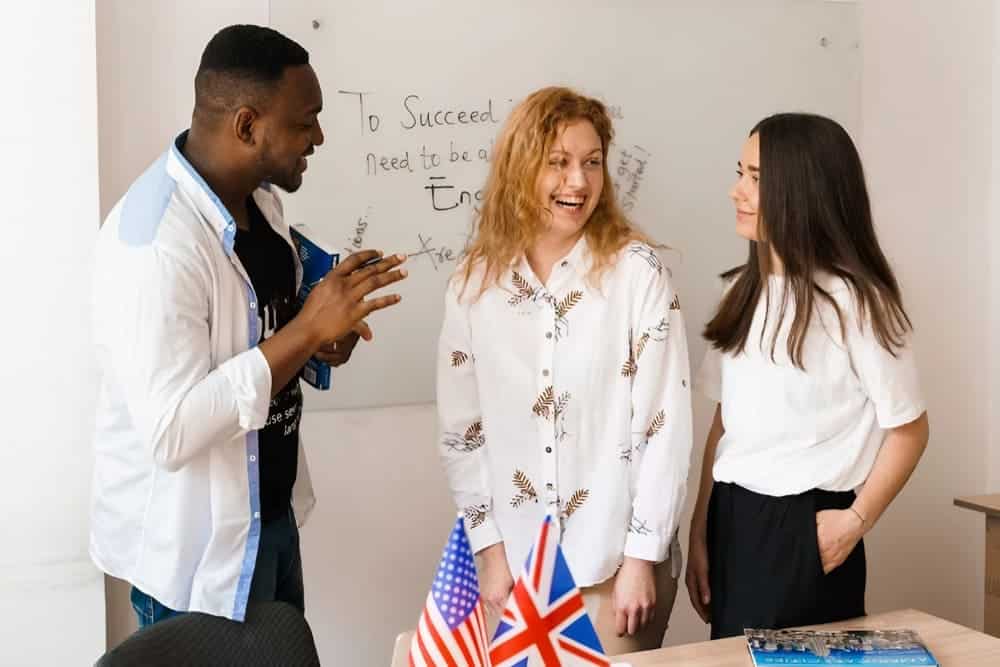Describing photographs
In some speaking exams, you have to talk about photos or pictures. Watch the video of two students doing this task on our website. The tips below will help you to do really well in this type of speaking exam.
Do:
· Look at your picture carefully and take a few moments to think before you start talking.
· Talk for all the time you are given. If you have one minute to do the task, use every second.
· Practise the useful language below so you can explain which part of the picture you are talking about.
Don’t:
· Panic if you don’t know the words for all the things in the picture. You don’t need to know all the words for everything in the picture if you know what to say when you don’t know an exact word.
· Get distracted and start talking about something else. Focus on the photo or picture.
· Panic if your mind goes blank. Take a deep breath, look at the picture and start again.
If you are asked to describe a photo or a picture in the exam, here is some language you can use:
| What is in the picture? | In the picture I can see … | There’s / There are … | There isn’t a … / There aren’t any … |
| Say what is happening with the present continuous | The man is …ing | The people are …ing | It’s raining. |
| Where in the picture? | At the top/bottom of the picture … | In the middle of the picture … | On the left/right of the picture … | next to in front of behind near on top of under |
| If something isn’t clear | It looks like a …| It might be a … | He could be …ing | Maybe it’s a … |
Some ideas
PART 1
PERSONAL QUESTIONS – SPEAKING
What’s your first name?
What’s your surname?
Tell me about your family.
What do you like doing in your free time?
What’s the weather like today?
Tell me about your home town or city.
How do you relax in the evening?
Do you have a large family?
Tell me about your favourite book.
When was the last time you went on a journey?
Do you like studying English?
Tell me about your job.
Where do you live?
What are you going to do next weekend?
Tell me about the last time you visited friends.
Can you spell your surname?
Do you like pets? Why?
Tell me about your favourite singer.
What did you do last weekend?
Can you spell your name?
Tell me about your first school.
What’s your favourite film? Why?
Where would you like to work at?
Where are you from?
What’s your favourite colour? Why?
What did you do last summer?
Which town do you live in now?
Have you always lived in your town?
What do you like / dislike about living in your town?
What do you like doing at the weekends?
Can you speak any other languages?
What kind of transport do you prefer to use when you travel?
What kind of TV programmes do you enjoy watching?
Do you play any sports?
What kind of magazines do you enjoy reading?
FAMILY
1. Describe your family
2. How much time do you spend with your family?
3. Do you get one well with your family?
STUDIES
1. What are you studying now?
HOMETOWN.
1. What are the advantages of living in your hometown?
2. Describe your hometown.
WORK
1. What do you do?
2. Do you enjoy your work?
. If you could change your job, what would you do?
4. What do you like about your job?
5. What do you dislike about your job?
WEATHER
1. What’s the weather like in your country’
2. Does the weather affect yoru mood?
3. What’s your favourite season of the year?
4. What do you like doing when it is hot/cold?
HOME
1. Describe your home
2. What kind of building do you live in?
3. What kind of building do you live in?
4. How long have you lived there?
TRAVEL
1. Do you like travelling?
2. What places have you visited?
3. Which country would you like to visit?
4. What’s the best place you have ever visited?
COMPUTERS
1. Do you think computers help society?
2. Do you think computers are bad for heatlh?
3. How do you think computers have changed the world?
INTERNET
1. What do you usually do on the internet?
2. Advantages and disadvantages of the internet
3. Do you do the shopping online?
1. How often do you check your email?
FRIENDS
1. Do you have a lot of good Friends?
2. What’s a good friend to you?
3. What do you usually do with your Friends?
4. Do you like sharing your free time with your Friends?
SMOKING
1. What do you think about smoking in public places?
2. Do you think smoking is bad for heatlh?
3. Wouuld you advise people not to smoke?
HOBBIES
1. Do you have any hobbies?
2. How much time do you spend on your hobby?
FILMS
1. Do you like watching films?
2. How often do you go to the cinema?
3. Who is your favourite actor/actress?
SHOPPING
1. Do you enjoy shopping?
2. How often do you go shopping?
3. Do you prefer to buy in a shopping centre or in small shops?
SPORT
1. Do you like sport / are you keen on sport?
2. Do you enjoy watching sports?
3. Which sports are more popular in your country?
4. What’s your favourite sport?
5. How often do you do sport?
FOOD
1. Do you enjoy cooking?
2. Have you got a healthy lifestyle?
3. Do you usually eat healthy food?
4. Do you like junk food?
TELEVISION
1. Do you like watching TV?
2. What do you usually watch on TV?
3. Do children spend too much time watching TV?
4. Advantages of watching too much TV.
TOURISM
1. Do a lot of tourists visit your country?
2. Is your country expensive / cheap for tourists?
DAILY ROUTINE
1. Describe your daily routine.
2. Do you have a lot of free time?
3. What do you usually do in the morning / afternoon / evening?
4. What do you usually do at weekends?
CLOTHES
1. What types of clothes do you like wearing?
2. How important is fashion to you?
GOING OUT
1. Do you like going out or staying at home?
2. How often do you go out?
MUSIC
1. Do you like music?
2. Do you play any musical instrument?
3. What’s your favourite kind of music?
EDUCATION
1. What was your favourite subject as a child?
2. do you think your country has an effective education system?
OTHER QUESTIONS
1. How many languages do you speak?
2. Do you think that English will be useful for your future? Why?
3. What would you like to do when you finish university?
4. What kind of job would you like to do in the future?
5. Are you a morning/ evening person?
6. Where do you usually spend your holidays?
7. Advantages of new technologies
8. What’s your opinion about the financial crisis in your country?
9. Have your ever lived in a foreign country?
10. Would you like to live abroad?
11. If you had the chance, would you take a year off?
12. Do you like Reading?
– Where do you live?
– Do you like your city?
– What are you wearing today?
– Can you describe the room where you are?
– Describe the place where you are living
– Favourite actor/actress
– What’s the weather like today?
– What was your first school like?
– What do you usually do in your day?
– What’s your favourite place?
– What are your best friends like?
– What do you usually do with your best friends?
– What do flowers mean in your country?
– What are flowers important?
– Which was the last time you visited a friend
– Who gifted me flowers.
PART 2
– Two fathers with their daughter and the daughter is opening a present.
– A man wearing an orange dress who is dancing. We can see the man three times. The background is White.
– Photo of a TV. Questions: Tell me about your favourite Tv shows. Do you think there is too much violence on TV? Do you prefer watching series or films?
– A group of young people having fun in a cinema – How people laugh in the different countries? What was the last time you laughed?
– Mountain and beach – Which one do you prefer? – Which one is safer for children?
– Un pintor pintando – no se ve lo que está pintando – está pintando
– Niño con un ramo de flores tapándole los ojos a la madre.
– Un niño chino que leía un libro.
– Una foto con rascacielos
PART 3
– Scientific Lab vs Computer room.
– A couple is going to the cinema. Questions: Do you think is it better going to the cinema or watching a film at home?
– [Pictures of 2 offices] What kind of people work in these offices? Which one would you like to work in? Why?
– In the photo you can see a salesman in a Little shop, in the other there is a couple who is buying in a supermarket: What type of people buy in these places? In which one do you prefer buying?
– In a picture people working in the kitchen and in the other lots of miners working. Which work is more difficult? Which one do you prefer? Advantages or disadvantages of these Jobs?
– A couple with two suitcases in a city and the other a man taking a photo to a landscape where there is a river. Which way of travelling do you prefer?
– A pair of couples. Some are buying pizza and other healthy food.
PART 4
– Do you like travelling? Where would you like to go? Why?
– How the weather affect people and the relationships.
– Do you think it is necessary to sleep. Sleeping affects personality.
– A man with a scarf in the head. Questions: which are the clothes you prefer wearing? Why do you think people dress in different way? Do you think that is good?
– A Football stadium. Questions: benefits of sport. Which was the last time you watch a match? Do you like sports? Do you think sport is good or bad?
– Tell me about the last birthday party you went to. How did you feel? What is the best gift you could give to a person?
– Talk about a time when you were on your own. How did you feel about it? What are some of the ways of passing time on your own?
– Talk about a book that is important for you. How has it helped you? Do you think computers will replace books in the future?
– Talk about a time when you worked under pressure. How did you manage your time effectively? Do you think some people work better under pressure?
– Talk about a time when someone told you to stop doing something. How did you feel about it? Do you think there are too many rules in modern life?
– Talk about a personal achievement or award you have received. How did you feel about it? Do awards encourage people to do their best?
– Talk about an ambition you have for the future. Why do you have this ambition? Are ambitions necessary to keep people motivated?
– Talk about an important event in your life. How did the event make you feel when it happened? How do events bring people together?
– Talk about an object you own. How would you feel if you lost it? Do you think that non-electronic devices have lost their importance in society?
– Talk about the most memorable teacher you had at school. How did he / she make you feel in class?
Do you think teachers can change the way children are in the future?
– Talk about the first thing that you bought online. How did you feel about the purchasing? Would you recommend online shopping?
– Talk about a trip that you planned on your own. How did you feel while planning it? Did the trip fulfil your expectations?
– Tell about a time in which you got lost. How did you feel? What do you think people do when they get lost?
– Talk about a present you have received. What did you feel when you were given it? Why do people make presents?
Comparing photographs
Sigue estos pasos:
1. Repasa los comparativos
Ya que lo que vas a hacer es comparar dos fotos, debes saber bien cómo hacer los comparativos en inglés.
2. Repasa los conectores
Es importante hablar con coherencia y cierta fluidez. Para lograrlo deberás aprender a unir una frase con otra, y la forma de unirlas es con las conjunciones (connectors).
3. Aprende a detectar las similitudes y diferencias de las fotos
Cuando compares las dos fotos, busca estos contrastes (sí, este es el truco para aprobar, si consigues decir estas comparaciones con cierta fluidez y precisión):
– Diferencias y similitudes en la actividad que las personas realizan en las fotos. Nota: Esta es la comparación más importante porque suele haber bastante contraste entre las actividades que realizan las personas en cada una de las fotos.
Ejemplos:
| In the first photo they are playing, and in the second photo they are watching TV. | En la primera foto están jugando y, en la segunda, miran la televisión. |
| The woman is singing and the man is dancing. | La mujer está cantando y el hombre bailando. |
| They’re all taking a big risk. | Todos se están arriesgando mucho. |
| One is taking a big risk – he is going to jump from a cliff- and the other one is just swimming. | Uno se está arriesgando mucho, va a saltar desde un acantilado, y el otro sólo está nadando. |
– Diferencias y similitudes en la edad de las personas
Ejemplos:
| The woman is much younger than the man. | La mujer es mucho más joven que el hombre. |
| They are both about the same age. | Ambos tienen aproximadamente la misma edad. |
| Everybody is very young. | Todo el mundo es muy joven. |
| They are all teenagers. | Todos son adolecentes |
– Diferencias y similitudes en el número de personas y cosas que hay en las fotos.
Ejemplos:
| There are fewer people in the second photo. | Hay menos gente en la segunda foto. |
| In the first photo there are more people than in the second photo. | En la primera foto hay mucha más gente que en la segunda foto. |
– Diferencias y similitudes en el aspecto físico de las personas y cosas.
Ejemplos:
| The woman’s clothes are much darker than the man’s. | La ropa de la mujer es mucho más oscura que la del hombre. |
| The boy’s eyes are blue and the girls’ one are brown. | Los ojos del niño son azules y los de la niña son marrones. |
| They are both very tall. | Ambos son muy altos. |
| They are all wearing a jacket. | Todos llevan chaqueta. |
– Diferencias y similitudes en el aspecto emocional de las personas.
Ejemplos:
| They are both crying. | Ambos lloran. |
| The people in the first photo seem to be very happy and the in the second photo they seem to be worried. | La gente de la primera foto parece estar muy contenta y en la segunda foto parecen estar preocupados. |
| The woman is very confident while the man is scared. | La mujer está muy segura de si misma y el hombre está asustado. |
4. Compara, contrasta, especula, incluye tus opiniones personales al final y corrige lo que has dicho.
Expresiones útiles para comparar.
– In the first photo/picture there is a man wearing a tie.
En la primera foto hay un hombre que lleva corbata.
– In the second photo the man is wearing a bathing suit.
En la segunda foto el hombre lleva un bañador.
– The first picture shows a nice house in the mountains.
En la primera foto se puede ver una bonita casa en la montaña.
– And, the second picture shows a house on the beach.
Y, en la segunda foto, se puede ver una casa en la playa.
– In the background, there is a gate. En el fondo (detrás) hay una puerta.
– In the front, there is a girl jumping. Delante hay una niña saltando.
– On the side, there are people sitting on a bench. Al lado hay gente sentada en un banco.
Expresiones útiles para contrastar.
– On the one hand, the first group of people are supposed to be working in an office, but on the other hand, they are watching television.
Por un lado, se supone que el primer grupo de gente está trabajando en una oficina, pero, por el contrario, está mirando la televisión.
*Nota importante. «On the one hand and on the other hand» se utiliza para contrastar situaciones DIFERENTES o CONTRADICTORIAS. No sirve para comparar situaciones semejantes.
Otro ejemplo:
– On the one hand, the man wants to jump, but on the other hand he is very scared.
Por un lado el hombre quiere saltar, pero por otro lado, está muy asustando.
In contrast, the second house is much bigger than the first house.
Expresiones útiles para especular.
– Perhaps they want to get married, but they can’t.
Quizás quieren casarse, pero no pueden.
– I think the first person is in a hurry and wants to get home early, and the second person is very tired. Creo que la primera persona tiene prisa y quiere llegar a casa pronto, y la segunda persona está muy cansada.
– It seems like they don’t know too much about the job they are doing because everything they have done so far is wrong.
Parece como si no supieran mucho acerca del trabajo que hacen porque todo lo que han hecho hasta ahora está mal.
– Maybe the man has still too much work to do and that’s the reason why he looks so tired.
Quizás el hombre todavía tiene mucho trabajo por hacer y por eso parece tan cansado.
Expresiones útiles para dar tus propias opiniones.
– Personally, I would never do that.
Yo mismo nunca haría eso.
– I would like to go on a holiday to a place like that.
Me gustaría ir de vacaciones a un lugar así.
– In my opinion it isn’t a good idea to start doing that without rehearsing.
En mi opinión no es buena idea empezar a hacer eso sin ensayar.
Expresiones útiles para utilizar si te equivocas y quieres corregir lo que has dicho
– Sorry, I didn’t mean that, I meant that. Perdón, no quería decir eso, quería decir que…
– Let me rephrase my idea. Déjeme expresar mi idea de otra manera.
– I take that back, what I really wanted to say. Retiro lo que he dicho, lo quería decir en realidad…
5.Practica las preguntas y respuestas en grupo
Si no realizas este ejercicio con un profesor que te prepare, es recomendable practicar este tipo de preguntas con otros estudiantes, a ser posible tres. Uno debe coger el papel de examinador y los otros dos de candidatos. Se deberán seguir las mismas instrucciones del examen y luego cambiar de papel.
6. Utiliza estos ejemplos para practicar


Both photos show teenagers playing, but in a very different way. In the first picture, we can see a group of teenagers who are doing sports outside.
- Comparando las actividades que hacen ambos grupos:
En ambas fotos se ven adolescentes jugando, pero de maneras muy diferentes. En la primera foto podemos ver a un grupo de adolescentes que hacen deporte al aire libre.
It’s a very sunny day and they seem to be enjoying themselves.
- Describiendo el lugar donde está el primer grupo y especulando sobre el estado de ánimo del primer grupo.
Es un día muy soleado y parece que lo están pasando bien (que están disfrutando).
In the second picture, we can see two teenagers playing a videogame, they are inside and they seem to be very concentrated on what they are doing.
- Describiendo lo que hace el segundo grupo, dónde y especulando sobre su aspecto físico.
En la segunda foto, podemos ver a dos adolescentes jugando un vídeo-juego, están dentro de casa y parecen muy concentrados en lo que están haciendo.
In the first picture, all the girls are wearing sport clothes and in the second picture both young men are wearing a pair of jeans and a shirt.
- Comparando la ropa que llevan ambos grupos.
En la primera foto, todas las chicas llevan ropa para hacer deporte y en la segunda foto los chicos llevan vaqueros y una camisa.
Personally, I like what the girls are doing much more, they are outside, doing sports, meeting other girls the same age and talking to them. Besides they seem to be enjoying the fresh air and the sunny day, while in the second picture both boys are sitting and seem to be a bit stressed. I’m sure they are enjoying themselves, but it doesn’t show on their faces.
- Dando mi opinión personal.
Personalmente, me gusta mucho más lo que están haciendo las chicas, están fuera, haciendo deporte, encontrándose con otras chicas de su misma edad y charlando. Además, parecen estar disfrutando del aire fresco y el día soleado, mientras en la segunda foto, ambos chicos están sentados y parecen estar algo estresados.
The photos show the contrasts between how young people spend their free time in our modern society. In my opinion, the situation in the second picture is becoming more and more common. I think there should be a balance between the two. You can spend time playing videogames, but it’s also important to spend your free time outside doing sports.
- Dando mi opinión personal y una conclusión.
En las fotos se pueden ver los contrastes entre cómo la gente joven pasa su tiempo libre en nuestra moderna sociedad. En mi opinión, la situación de la segunda foto está siendo cada vez más frecuente. Creo que debería haber un equilibrio entre las dos. Puedes pasar tu tiempo jugando a vídeo-juegos, pero también es importante pasar tu tiempo libre fuera haciendo deportes.
Agree or Disagree
Ask for opinion:
- What are your thought on all of this?
- What do you think about (that)?
- Could you tell me your opinion about…?
- Wouldn’t you say…?
- How do you feel about (that)?
- What’s your view on…?
- Do you agree?
Disagreement:
| I don’t agree |
| I don’t think so |
| No way |
| (I’m afraid) I disagree |
| I really can’t agree with you there |
| I totally disagree |
| I see your point but… |
| I beg to differ |
| I’d say the exact opposite |
| Not necessarily |
| That’s not always true |
| That’s not always the case |
| No, I’m not so sure about that |
Agreement:
| I (totally) agree |
| You have a point there |
| That sounds good |
| I couldn’t agree with you more |
| That’s a great idea |
| I agree with you 100 percent |
| You’re absolutely right |
| That’s fine |
| That’s OK with me |
| No doubt about it |
| Tell me about it! (informal) |
Si te interesa aprender más sobre las reglas gramaticales y curiosidades del idioma, en The Academy ofrecemos clases de inglés en Granada en donde aprenderás de la manera más entretenida y práctica. Cumple tu meta de aprender inglés, contacta con nosotros y consulta sobre los cursos que podemos ofrecerte. Siempre tendrás la alternativa de elegir el más adecuado a tus necesidades.
• Director del centro
• Administración del centro
• Exámenes


